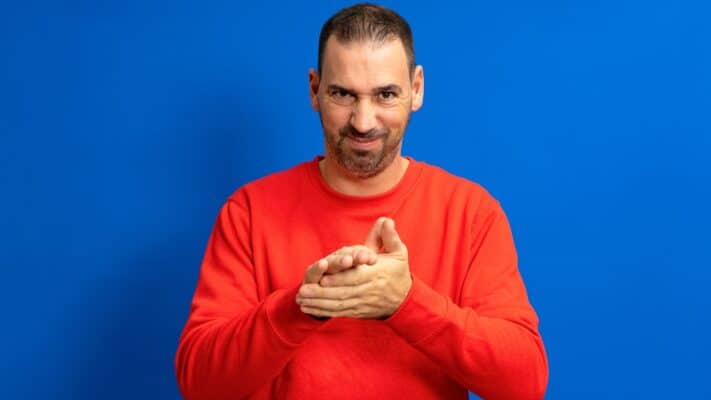Have you ever told a lie?
If your answer is no, perhaps think again. Now, I want to start this article by getting off on the right foot and we’re only one sentence in – so, let’s not fib just yet.
Actually, I’ve changed my mind. Don’t bother fibbing at all. In this article, I’ll tell you why that is – and, if you relish in telling untruths, I’m about to convert you. Just wait and see.
Time to Face Reality
Truth be told, no one tells the truth.
We’ve all told that one fib, perhaps it was just a white lie – convincing someone you’re not doing anything for their birthday, when in actual fact, the guests are hiding in the garage for the surprise party. It could even be a little more drastic, and I know there are some wicked liars among us – I’m talking about cheating on your partner, or god forbid, committing fraud.
When you consider it, the concept of petty lying on a day-to-day basis is rather pointless. Who’d want to willingly lose feelings of trust and companionship, and trade them for guilt and regret? Not me. Yet somehow, we continue to do it.
I promised myself I wouldn’t delve too deep into scientific matters, but in essence, humans lie because of how we’ve evolved. The cleverer ones among us tend to be the best trickers, and this sort of defensive and deceiving behaviour once helped our species many moons ago.
To say it helps our species now, in this day and age, is a bit of a stretch. It’s a hindrance. Especially given the surge of social media, keeping secrets is a thing of the past. Anybody can turn into a detective at the click of a finger and uncover just about anything they want, simply by doing a Google search or (sneaky) stalk session on Facebook. Someone will always know someone who knows someone, and the truth will crawl its way back to you.
If they’re still casting for the next James Bond film, sign me up, please – I’m that good of a spy. Much of my pain has been caused by my ability to discover anything. As they say, curiosity killed the cat.
We’re Lied To
Let’s start by exploring the most obvious victim here – the person who’s bracing the brunt of the lies. If you identify with that, my heart goes out to you. Being lied to is unbearable.
I’ll speak for some of the more sensitive souls of society, (and yes, I’m very much one of them) – lying is quite possibly one of the cruelest things you can do to us. I, for example, have a tendency to overthink – I’ll take your lies and run with them. It’s an absolute destructor of sound mental health. I’m also highly gullible, and spreading falsehoods is not only immature – it’s unfair. Understanding that your actions are hurting vulnerable people should be enough for you to stop in your tracks.
Painstakingly enough, I’m very tuned into body language – whilst your lips might not be moving, your expression is speaking a thousand words. I know every trick in the book: shifting eye contact, stammered words or sentences that sound so prepared it’s as if they’re being read from a script. And essentially, that’s what’s happening. The liar has adopted a role in the play they’ve written, and they’re reading out their rehearsed lines. It’s all fiction. So, beloved liars, you’ll have to find some new ways of getting away with it if you want to convince me.
We Do The Lying
Some people are naturally deceitful – if this applies to you, you must practice self-discipline and challenge those urges. You may not know it, but telling untruths can cause you the most harm – not just the victim. Don’t shoot yourself in the foot.
Whenever that forthcoming lie is about to roll off your tongue, you’re given two options – you can have the pain of telling the truth and dealing with it, or you can choose the pain of lying, feeling guilty for that and then being found out anyway. Which would you rather go for?
Some people lie in order to protect both themselves or others. If you’re in a state of avoidance and unable to practice acceptance, lying might be an easy task for you. It’s your self-protection; your barrier of defence. With each and every falsehood you tell, you’re making that barrier taller and taller, until you’re so isolated, there’s no way out. As you enter this stage of loneliness, those around you may have recognised your compulsive lying, and in a boy-who-cried-wolf type of situation, may avoid you completely. In this case, you need to accept your faults and find a way to restore people’s trust in you. Apologising and holding up both hands does not make you a weak person – instead, it shows your pure strength. Convincing yourself of a lie will not make it any truer – as soon as you recognise you’re in denial, you can battle the problem you face.
If you’ve lied unnecessarily or out of nastiness, you may well find that the people surrounding you have lost every ounce of respect for you. And, let’s be honest, rightly so. If you’ve deliberately lied to cause someone hurt, it’s inevitable that your negative actions will come back around to bite you. It may sting, but that’s karma. It will teach you a valuable life lesson, so learn from it.
Although I don’t condone the vast majority of lying, what I will say is this – the past is the past. We all make mistakes; we all say a wrong thing or two, especially when we come face-to-face with Mr Alcohol. Even if drink isn’t the catalyst for your lies, nobody on this planet is ‘perfect’. Not a single one of us. As long as you accept you’ve made an error, and you work hard to seek a solution, forgiveness is often your reward.
The troublesome pair of regret and guilt will keep you on strings, so be as honest as possible from day dot. Life’s too short to be tossing out lies left, right and centre. If you’ve landed yourself in a sticky situation like this, you’ve got no time to be embarrassed – come on, you can turn this around! You’ve still got years ahead of you to practice the saint-like behaviour that’s inside all of us, deep down. Nobody was born with bad and evil intentions. It’s your current mindset that owns them.
If you’re someone who has been lied to, I can understand the hatred and revenge that’s most probably brewing up inside you. If I’m deceived, I turn into a fierce fireball – lying is truly my biggest bugbear. I’d urge you to have patience, though. Be mature and empathetic, as we don’t know what’s going on behind closed doors, and there are often reasons behind every untruth.
Some people are suffering with conditions, disorders and habits that mean they genuinely can’t control the extent of their lying – but there are specialists who can lend them a helping hand. Therapists and professionals can offer both solutions and support to compulsive liars. Never be ashamed to ask for help.
There are some situations where lying is, in fact, the kindest thing to do. I’m talking about tiny white lies, where protecting someone is in your best interests. For example, when my late father was first diagnosed with cancer, he chose not to tell me it was terminal – I was only thirteen at the time, and it would’ve made things a lot worse for me. To this day, I’m comfortable with this ‘lie’, and I’m grateful that he chose to shield me.
If you’re debating whether a white lie is necessary, ask yourself, would I feel comfortable being lied to if I was the other person in this situation? And, if the answer is yes, allow yourself to be at peace with your choices. We rarely enjoy telling falsehoods, as it rattles our guilty conscience and tips over our internal scales. Once the need for the white lie has passed, be ready to explain yourself. Tell them your thinking behind it and apologise if necessary.
But Most Importantly, We Lie to Ourselves
We’ve all been faced with this situation – someone asks us how we are, we immediately paint that fake smile on our faces and blurt out the typical response of ‘Fine, thanks, how about you?’
Most of the time, though, you’re not fine. Not one bit. You’ve had too much on the to-do list and you’re in the middle of a family squabble and to top it all off, you managed to go to the vets appointment forgetting the dog. Our lives are chaotic, but for some reason, we never want to admit it.
When we think of the ‘victim’ in the storm of lying, we jump to the conclusion that it’s the person who is being fed the lies. Newsflash – there’s another victim, and it’s you. What’s more, you are your own enemy.
The more you lie to others, the more you lie to yourself. With each and every tale you fabricate, you’ll slowly start to believe them, too. And, before you know it, you won’t be able to differentiate between your own fact and fiction.
If you’re going through a tough time, you may be more focused on keeping a hard exterior rather than disclosing this information to the people who love you most. This is understandable, of course, and you shouldn’t feel guilty for this initial reluctance. However, you simply cannot lie to yourself. Being in denial and convincing yourself you’re absolutely fine will halt your healing process. Acceptance is key – your mind will thank you for it.
















